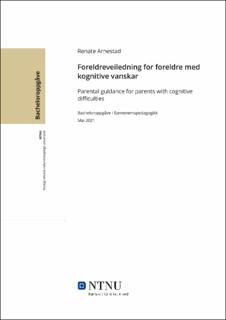| dc.contributor.advisor | Kojan, Bente | |
| dc.contributor.author | Arnestad, Renate | |
| dc.date.accessioned | 2021-09-28T18:48:19Z | |
| dc.date.available | 2021-09-28T18:48:19Z | |
| dc.date.issued | 2021 | |
| dc.identifier | no.ntnu:inspera:79529906:23313452 | |
| dc.identifier.uri | https://hdl.handle.net/11250/2785779 | |
| dc.description.abstract | Oppgåva kvilar på temaet foreldreveiledning og tar for seg problemstillinga: Kva utfordringar oppstår i veiledning av foreldre med kognitive vanskar i ein barnevernkontekst?
Barnet er prisgitt den omsorgssituasjonen dei får, men heldigvis kan ein moderat skeivutvikling endrast med eit adekvat omsorgsmiljø (Belsky & Fearon, 2010). Ved å arbeide med familien som heilheit vil ein kunne avdekke forstyrringar i foreldre-barn relasjonen tidleg. Dette kan gjerast gjennom foreldreveiledning noko litteraturen generelt er optimistisk til (Miller, 2015; Furlong mlf., 2012). For foreldre med kognitive vanskar er bilete noko annleis då foreldra bring med seg ulike utfordringar som det å forstå, tolke og nyttegjere seg av informasjon, både frå barnet og hjelpeapparatet (Tøssebro, Midjo, Paulsen & Berg, 2014, s.5). I lys av transaksjonsmodellen blir det påpeikt korleis forholdet mellom foreldre-barn og foreldre-hjelpar vil utløyse forskjellige responsar i kvarandre, og utfordringa blir å endre dei negative transaksjons sirklane som oppstår. Dette krev at ein som profesjon, organisasjon og samfunn anerkjenn og reflektera kring dei utfordringane som oppstår, samt korleis ein kan møte, samarbeide, kommunisere og myndiggjere desse foreldra. Ved å forstå foreldre med kognitive vanskar som innvend i og påverka av genetiske, sosiale, kontekstuelle og kulturelle faktorar, vil ein truleg sjå annleis rundt utfordringane som foreldre med kognitive vanskar bring med seg. Det blir naudsynt med eit større empirisk grunnlag for å forstå foreldre med kognitive vanskar betre, vurdere effekten av veiledning og for å utvikle verktøy som kan predikere foreldrenes framtidige omsorgsevne. | |
| dc.description.abstract | The theme the assignment is based on is parental guidance and it address the issue: What challenges arise in the guidance of parents with cognitive difficulties in a child welfare context?
child is at the mercy of the care situation they receive, but fortunately a moderate skewed development can be changed with an adequate care environment (Belsky & Fearon, 2010). By working with the family as a whole, one will be able to detect disturbances in the parent-child relationship early. This can be done through parental guidance, something the literature is generally optimistic about (Miller, 2015; Furlong et al., 2012). For parents with cognitive difficulties, the picture is somewhat different because of various challenges such as understanding, interpreting and utilizing information, both from the child and the support system (Tøssebro, Midjo, Paulsen & Berg, 2014, p.5). In light of the transaction model, it is pointed out how the relationship between parent-child and parent-helper will trigger different responses in each other, and the challenge will be to change the negative transaction circles that arise. This requires that one as a professional, organization and society recognizes and reflects on the challenges that arise, as well as how one can meet, collaborate, communicate and empower these parents. By understanding parents with cognitive difficulties as influenced by genetic, social, contextual and cultural factors, one will probably see different around the challenges that parents with cognitive difficulties bring with them. It becomes necessary to have a greater empirical basis for better understanding these parents, reading the effect of guidance and for developing tools that can predict parents future care ability. | |
| dc.language | nno | |
| dc.publisher | NTNU | |
| dc.title | Foreldreveiledning for foreldre med kognitive vanskar | |
| dc.type | Bachelor thesis | |
